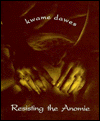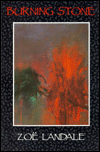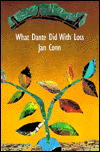Resisting the Anomie

by Kawame Dawes,
112 pages,
ISBN: 0864921470
Hero of the Play

by Richard Harrison,
58 pages,
ISBN: 0919897428
Burning Stone

by Zoe Landale,
106 pages,
ISBN: 0921870310
Remembering Mr. Fox

by Christopher Wiseman,
104 pages,
ISBN: 1550390546
Beyond My Keeping

by Elizabeth Philips,
ISBN: 1550500775
What Dante Did with Loss

by Jan Conn, Michael Harris,
104 pages,
ISBN: 1550650521
Post Your Opinion | | Brief Reviews - Poetry
by Rita DonovanPERHAPS IT IS THE TIMES OR THE AVERAGE age of the poet in these times, but the books I received for review overwhelmingly focus on family, loss, home and, sometimes, salvation. In certain cases, this involves an emotional land-grab, in others, a temporal rootlessness. Concerns overlap to the point where one feels that these poets have all been meeting in an exclusive cabal.
Jan Conn's What Dante Did with Loss (Vehicule, 104 pages, $9.95 paper), struggles with these issues. As the title indicates, this is a book of loss. Some of the poems deal with the persona's largely unresolved feelings over her mother's suicide and the violent effect it had on the family. For "home," too, is here, and the destruction of home, and the search ever after for that comfort. These elements produce some unevenness in striking but difficult poems such as "When You Were Ours" and "The Darker Blue Inside." More successful are "Until the Rain Has Come and Gone" and "Long Island, Summer 1952," where the feeling of loss reverberates in the very landscape, echoed by the poet in the words: "you cannot have those years back." This works because of Conn's eye for the physical and the tension she develops between the underlying emotional current and the intense presence of nature. (Conn has a doctorate and does research in the evolutionary history and genetics of South American mosquitoes.) The best of these poems couch pain in this larger context. It allows the poet moments of revelation, of beauty, even in the midst of loss and change:
Saunas at midnight when we floated away from the
earth,
briefly, and languished among the bright mysterious
stars
of the Milky Way, hammered into the black night sky
like the shiny relics of long-dead saints.
("Between Tofino, and Ucluelet")
If there is salvation it is in the "bright protoplasm of the present" ("La Virgen de la Paz"), which can counteract "how seductive sadness is" ("The Seductiveness of Sadness").
Christopher Wiseman's Remembering Mr. Fox (Sono Nis, 104 pages, $12.95 paper) is a book about time, about loneliness and loss among visitors and inhabitants at the Spa hotel in Scarborough, Yorkshire. While individual poems stand out, it is the cumulative effect of these moments that is the achievement here. Through visits, "postcards," and "photographs," Wiseman recreates the lives of the inhabitants, past and present, of this location. Mr. Fox, of the title poem, is one such character, and the poet portrays the elderly man with compassion and deference.
Portrayal, character -- these are the words of fiction, and there is much here that is storytelling, centred on family and home, and elegiacally recalling parents, uncle, past loves. The effect is archival -- as with Conn, there seems to be a need for the poet to record these things before life (and the sands along the beach at the Spa) washes them away. This passive insistence, this quiet intensity, marks Wiseman's work.
It is a book of ghosts. Yes, ghosts. When the persona returns to the Spa, a special rendezvous of his parents, he calls up their youthful spectres, whispering: "... please / To their ghosts to show themselves to me ("Tea Dances, My Father's Motorbike").
The last section of the book feels appended, concerning itself less with this larger "family" and more with personal reminiscences of and meditations on lost love and lost potential. 'Me poems themselves are not at issue; one wonders why they had to appear in this carefully orchestrated volume.
Zoe Landale's Burning Stone (Ronsdale, 115 pages, $10.95 paper), too, is filled with ghosts, ghosts that will not lie still but rattle incessantly in the author's ears. The first section, in fact, is entitled "My Beautiful Ghosts" and draws the reader into a world of photographs, family histories, and versions of the past. 'Mere are angry, embittered poems about grandmothers, devastating ones about grandfathers: "He beat his children so they dimpled / soft as red cedar, / never meant for hammering" ("Photomontage").
Elsewhere in the same poem the poet offers:
The word family has misted me. I had hoped for kisses all round affection heady as brandy
The speaker notes, however, that "there is no safety in these people." This is a home truth, something she vacillates upon but ultimately seems to understand. Just as there is no safety in these people, neither did these people enjoy such safety. It is a truth that allows her to re-evaluate certain family members and ultimately to take the first steps towards forgiveness.
This book suffers from a weak internal section ("Black Fire"), and some of the poems appear therapeutic in nature, but it is fierce in its honesty. Landale's haunting is our own.
Sustenance comes in many forms. And in Richard Harrison's Hero of the Play (Wolsak and Wynn, 60 pages, $ 10 paper), the constant is the game of hockey. Employing "The Game" in all its facets, "hockey as motif' is the starting point for this series of prose poems that depict the speaker's life, his loss of love and family, the redemption found in a new love, and his specific understanding of the structures of male friendship. These last poems in particular are fascinating, offering the non-male, non-hockey playing reader a glimpse of both the barriers separating men and the invisible bonds that connect them. That this poem also speaks of the persona's loss of stepchildren from a previous relationship is significant.
This intermingling of traditionally "male" material and issues like loss and heartbreak makes the book universally accessible. An example of the book's seamlessness is heard in the poem "Stanley Cup," where the poet empathizes with all of the players who ever hoisted the trophy:
... And that word -- holy -- appears most in the conversation of veterans who know how the touch fades, the shoulder takes longer between days of easy movement, how Bobby Hull passed over his chance to drink champagne from its lip when the Hawks won it in '61 because he thought there'd be so many in his life. Some take the Cup apart, clean the rings, make minor repairs in their basements, and then inscribe on the inside of the column the unofficial log of their intimate knowledge. This way I have loved you.
It is the love that one recognizes, whatever its manifestation.
In Resisting the Anomie (Goose Lane, 112 pages, $12.95 paper), by Kwame Dawes, the reader encounters a powerful voice. Dawes, winner of Britain's Forward Poetry Prize for his book Progeny of Air, is a writer, singer/songwriter, actor, and teacher. His love of music, particularly reggae, is evident in these poems of home, family, and politics. Dawes's Jamaican upbringing is evoked in poems about the influence of family members no longer present, particularly Neville Dawes, himself a poet. This book, too, speaks to ghosts. At one point, the author imaginatively addresses Neville:
How many miles have you travelled from home, journeyman from the archipelago flung in arcs of seed through the air? Broadcast, you land and sprout renaming home with memories still echoing
("House Arrest")
The final section ("Dry Bones"), is political in nature. Here music is never far from the word. There are responses and refrains, as in "History Lesson Eight A.M.":
No wonder I can't find Discovery Bay Was looking for the gold And all I see is blood All I see is blood All I see is blood
The book is open-ended in the sense that one feels a "story" still evolving. This energy itself is uplifting; it supports one, moves one on.
The most joyful take on loss, family, and salvation comes in Elizabeth Philips's Beyond My Keeping (Coteau, 80 pages, $9.95 paper). For Philips, nature is both sustenance in and of itself (she is a gardener and a fish-keeper), as well as a meditative springboard. The language is, simply, beautiful. Words flow like the poet's own fish: "the fish flow on, small pockets of air/ slippered in gold" ("Fish Keeper's Meditation").
Not only are the images startlingly visual -"[the fish] parachuting on long billowing fins to the bottom of the pond" ("The Goldfish Keeper") -- but they are tied to a wholly convincing voice. There is the same "immediacy" in nature (with echoes of Theodore Roethke) that appeared in some of Conn's work. But while Conn's vision almost always ends in loss, Philips most often leans into the light.
All of these poets speak of universal concerns, but the revelations they arrive at are often personal and not always transferable. In the poetry of Elizabeth Philips, however, the reader is generously blessed:
My eyes are east, always rising to the light. They see the world spin through space like a single cell, blue drop of rain on night glass, spider in a web of stars.
("Fields of Care") |